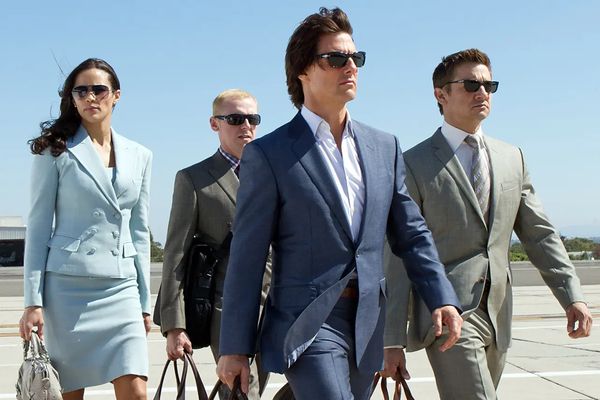Eye For Film >> Movies >> Mission: Impossible - Ghost Protocol (2011) Film Review
Mission: Impossible - Ghost Protocol
Reviewed by: Anton Bitel

Just busted out of a Moscow prison by fellow Agents Jane Carter (Paula Patton) and Benji Dunn (Simon Pegg) near the beginning of Mission: Impossible – Ghost Protocol, protagonist Ethan Hunt (Tom Cruise) goes through a routine now familiar from both Bruce Geller's original TV series and the subsequent blockbuster film franchise of which this is the fourth instalment. After having his retinas scanned by what appears to be an ordinary payphone, Hunt receives his impossible mission (to infiltrate the Kremlin itself) from a disembodied male voice which ends with the now expected words: "This message will self-destruct in five seconds." Hunt coolly walks towards camera, his back to the phone, evidently unperturbed by the explosion that both he and we know is about to take place right behind him.
If this is a moment of pure action-movie cliché, it is about to be subverted. When the expected explosion never comes, Hunt hesitates, turns, heads back awkwardly, and gives the phone a firm whack until it emits a thin stream of smoke that evaporates – much like Hunt's own aura of infallible cool. It is a sequence that sets the tone for a film in which, unlike in its predecessors, there is more failure than triumph over impossible odds. Here state-of-the-art gadgets (wall-clinging Gecko Gloves, the now-iconic mask-making machine, an anti-gravity suit) malfunction, an absurdly high-tech vehicle is brought to a complete standstill by a crowd of pedestrians, and missions repeatedly go wrong. The phone box may have just fizzled out, but the next time there is an explosion at Hunt's back, it will send him straight to hospital.

It is now a decade and a half since the first Mission: Impossible movie was released, and although Cruise still performs most of his own, frankly breathtaking stunts – and is NEVER heard to declare, "I'm too old for this shit" – his advancing years (he is nearly 50) are reflected in a new vulnerability to his character, breaking through the unstoppable alpha-male image that has served Cruise so well over the years with US audiences.
This actor, once the embodiment of the American dream, now plays a character who, along with his tiny, improvised team, has been forced to go rogue in order to save the world – and so he dramatises an America that is, in the shifting world order, as weakened, diminished and isolated as Hunt himself.
In this context, there is a special resonance to the coincidence that Hunt's organisation, dissolved in the film under the titular 'ghost protocol', shares its acronym with the International Monetary Fund. Contemporary anxieties about global economics are here staged as globe-trotting thrills, all in aid of restoring the US's tarnished name as the world's protector – while the film entertains the supposedly comforting fantasy that the greatest threat to American hegemony remains a Cold War-style villain.
Hunt's elite squad may be able to unmask and bring down Hendricks in a few days (or just over two hours of screen time) with relative ease – something that America's combined special forces took considerably longer to achieve in the case of Osama Bin Laden – but curbing the rise of new economic superpowers, the explosion in US debt and the destruction of American industry would, one suspects, truly prove a mission impossible for Hunt even if he had not been disavowed by his US handlers.
MIGP is all a bit Bond – an impression that Brad Bird, significantly also the director of The Incredibles, never attempts to disguise in his first live-action feature. The opening credits trace the trademark burning fuse of Mission: Impossible through a kaleidoscope of images in the stylised mode of a 007 movie. What follows is a breakneck series of set-pieces - naturally in 'exotic' locations (Budapest, Moscow, Dubai, Mumbai) - of the kind that agents Connery, Lazenby, Moore, Dalton, Brosnan and Craig have made their standard operating procedure. And as with any Bond movie, it stands out from its predecessors merely by bringing both its on-screen technology (the gadgets) and its filmmaking technology right up to the cutting edge, and by capturing something of the contemporary zeitgeist.
Some of the stunts here are insanely visceral – when Hunt is not clambering up and down the exterior of the world's tallest building, Burj Khalifa, with the benefit of IMAX to capture every vertiginous sweep of the edifice's reflective surfaces, he is chasing his target (both on foot and by car) through the middle of a massive, blinding sandstorm.
Yet in this post-Transformers era, when over-the-top spectacle can leave viewers feeling oddly jaded, Bird has two other trump cards. First, he doubles up his narrative to double the tension. If Hunt and his team are sneaking into the Kremlin, then Hendricks is doing likewise at the same time. While Hunt and his new colleague Brandt (Jeremy Renner) are on one hotel floor impersonating Hendricks' associates Wistrom and Lisenker in order to purchase stolen nuclear launch codes from mercenary assassin Sabine Moreau (Léa Seydoux), Carter is on another floor impersonating Moreau to sell copies of the codes to Hendricks' men. This multiplication of parallel scenes allows Bird to introduce rapid cross-cutting, making it difficult for even the easily distracted to get bored with what are, in the final analysis, stock cloak-and-dagger scenes.
Best of all, though, is the elevation of technical wizard Dunn, a minor character in Mission: Impossible III, to the status of a main player. Hero Hunt can be a rather earnest, intense character, but whenever he – and MIGP – risk taking themselves too seriously, you can count on Dunn to point up the inherent absurdity of all their action posturings, with Pegg effectively doing a Hot Fuzz on the film from the inside and uttering aloud precisely the sort of mocking critique that we are all thinking to ourselves. The effect is akin to watching a film and its parody all at once.
Even Dunn, however, is left essentially to comment from the sidelines. In fact the film is at its weakest when it imagines that viewers care about Hunt's personal life and the fate of his wife Julia from the previous instalment. Most viewers probably will not - but those who do, and who invest the requisite emotional engagement with his character's backstory, will be rewarded with the cinematic equivalent of an upturned finger, as the film delivers a dubious payload of twisty double-takes that, though consistent with the franchise's penchant for masks, duplicity and bluffs, feel insultingly dishonest. It is no revelation that spies tell lies – but after Hunt's extraordinary deceptions, he would need more than Cruise's famous winning smile to regain the trust of his crew for the next inevitable sequel.
Following the phenomenal sequences up on the Dubai skyscraper, it seems that the only way is down, and the film struggles to achieve those dizzying heights again. Subsequent scenes feature a car that plummets headlong several storeys to the ground below, Brandt entering a controlled fall down a shaft, and a bomb that drops - with a fizzle - from the sky – all of which encapsulate the film's faltering downward trajectory to crashing anticlimax.
Perhaps, much like the public phone at the beginning that holds out all promise and no delivery, MIGP is meant to be a broken down film for a broken down age. But if we are watching Hunt caught, like the western world, in an inexorable downward spiral, we may crane our necks to watch the carwreck, but also wonder if this uneven franchise remains roadworthy.
Reviewed on: 13 Dec 2011

















